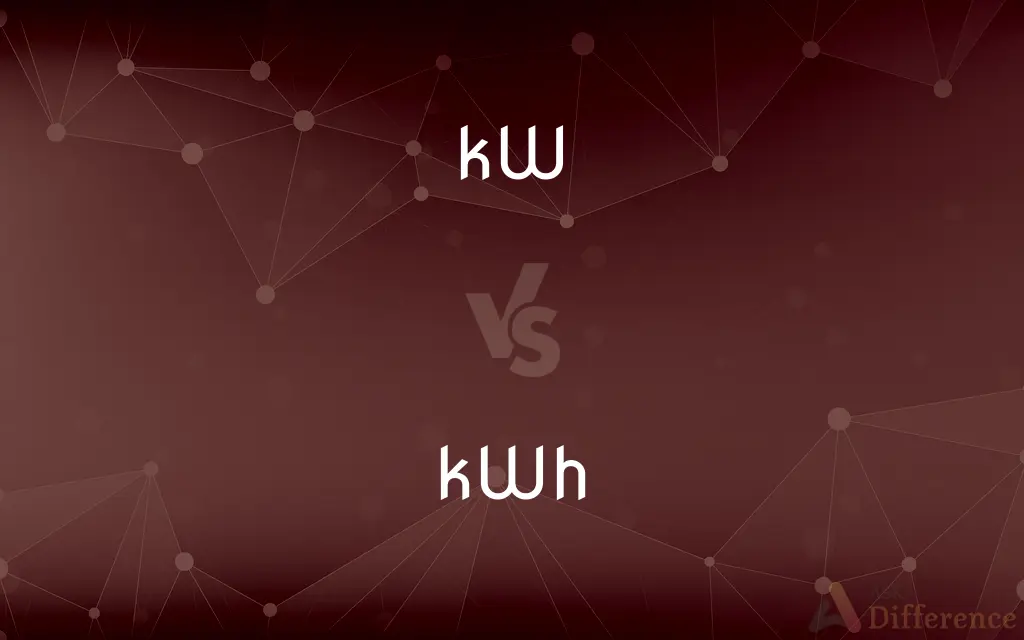kW vs. kWh — What's the Difference?
By Fiza Rafique & Maham Liaqat — Published on July 27, 2024
kW (kilowatt) measures power or the rate of energy use, while kWh (kilowatt-hour) measures energy consumption over time, quantifying the total energy used.

Difference Between kW and kWh
Table of Contents
ADVERTISEMENT
Key Differences
kW, or kilowatt, is a unit of power in the International System of Units (SI) that represents a rate of 1,000 watts of energy being used or produced at any instant. It is commonly used to describe the capacity of electrical devices, such as generators and motors, indicating how much power they can handle or produce instantaneously. On the other hand, kWh, or kilowatt-hour, is a unit of energy that measures the total amount of energy consumed or produced over a period of time. It is often used for billing electricity usage, as it reflects the actual energy used by a household or business over a billing period.
When considering electrical appliances, the kW rating indicates the power level at which the device operates. For example, a 1.5 kW air conditioner uses power at a rate of 1.5 kW when running. Whereas, if that air conditioner runs for 2 hours, it consumes 3 kWh of energy (1.5 kW * 2 hours), illustrating the relationship between power (kW) and energy consumption over time (kWh).
The distinction between kW and kWh is crucial for understanding energy efficiency and the cost of operating electrical equipment. Knowing the kW rating of a device helps in understanding its power demand, while the kWh consumption provides insight into the longer-term energy use and cost implications. For instance, a device with a high kW rating might seem powerful but could be more costly to operate if used frequently, as reflected in kWh.
Energy providers charge customers based on kWh, not kW, because kWh accounts for the actual energy used over time, making it a more accurate measure of consumption and cost. This billing method encourages consumers to be mindful of not only the power of the devices they use but also how long they use them.
Understanding the difference between kW and kWh also aids in evaluating energy sources and storage options. For example, solar panels are often rated in kW to indicate their power generation capacity at peak sunlight, while batteries are described in terms of kWh to specify how much energy they can store and supply over time.
ADVERTISEMENT
Comparison Chart
Definition
A unit of power equal to 1,000 watts.
A unit of energy equal to one kilowatt of power expended for one hour.
Represents
Rate of using or generating energy.
Total energy used or generated over time.
Used to Measure
Capacity of electrical devices.
Electricity consumption or production.
Billing
Not directly used for electricity billing.
Used for calculating electricity bills.
Example Usage
Describing a motor’s power capacity.
Measuring energy used by a household.
Compare with Definitions
kW
Reflects instantaneous power demand or supply.
Running three 1 kW appliances simultaneously requires 3 kW of power.
kWh
A unit of energy that measures total electricity use over time.
If a 1 kW device runs for 5 hours, it consumes 5 kWh of energy.
kW
Used to rate the power capacity of electrical devices.
The electric motor has a maximum output of 10 kW.
kWh
Reflects the actual energy consumption of electrical devices.
Last month's electricity usage was 300 kWh.
kW
Indicates how fast energy is being consumed or produced.
A 5 kW solar panel system can generate power at a rate of 5,000 watts under optimal conditions.
kWh
Basis for electricity billing by energy providers.
At 10 cents per kWh, using 100 kWh costs $10.
kW
A measure of electrical power, indicating energy use rate.
A heater rated at 2 kW uses energy at a rate of 2,000 watts.
kWh
Helps in assessing the cost-effectiveness of energy use.
Reducing daily energy consumption can significantly lower monthly kWh and reduce bills.
kW
Essential for understanding device efficiency and capability.
An air conditioning unit with a higher kW rating cools more quickly but may cost more to operate.
kWh
Indicates the energy storage capacity of batteries.
A battery system with a capacity of 10 kWh can supply 1 kW over 10 hours.
kW
A unit of power equal to 1000 watts
Common Curiosities
Can a device with a lower kW rating consume more energy than one with a higher kW rating?
Yes, if the device with a lower kW rating is used for a longer period, it can consume more energy (kWh) than a device with a higher kW rating used for a shorter time.
What does kW stand for?
kW stands for kilowatt, a unit of power equal to 1,000 watts.
How does knowing the kW and kWh help in saving electricity?
Understanding kW helps in selecting efficient appliances, and tracking kWh consumption aids in managing usage to save on electricity bills.
How is kWh calculated?
kWh is calculated by multiplying the power in kilowatts (kW) by the time in hours (h) the power is used.
Is a higher kWh always more expensive?
Generally, yes, as kWh measures energy consumption, and higher consumption usually leads to higher bills, depending on the rate.
How can I reduce my kWh usage?
Reducing kWh usage involves using more energy-efficient appliances and minimizing the usage duration of high-power devices.
Why is my electricity bill measured in kWh and not kW?
Electricity bills are measured in kWh because it reflects the total energy consumption over time, providing a basis for billing the actual use.
How do solar panels use kW and kWh?
Solar panels are rated in kW to indicate their maximum power output, while the energy they produce is measured in kWh over time.
What's the difference between kW and kWh in terms of energy storage?
kW indicates the power capacity (rate of energy flow), while kWh shows how much energy is stored or can be delivered over time.
Does charging a battery use kW or kWh?
Charging a battery uses power (kW), but the energy stored is measured in kWh, reflecting the total charge over time.
Share Your Discovery

Previous Comparison
Dietary Supplements vs. Nutraceuticals
Next Comparison
Beats Studio 2 vs. Beats Studio 3Author Spotlight
Written by
Fiza RafiqueFiza Rafique is a skilled content writer at AskDifference.com, where she meticulously refines and enhances written pieces. Drawing from her vast editorial expertise, Fiza ensures clarity, accuracy, and precision in every article. Passionate about language, she continually seeks to elevate the quality of content for readers worldwide.
Co-written by
Maham Liaqat












































